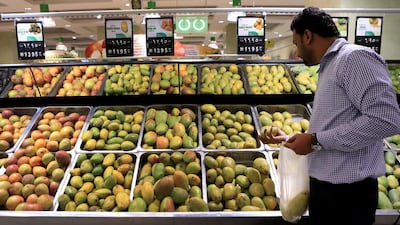DUBAI // Consumers on Wednesday expressed concern at reports that said unacceptable levels of pesticides had been found in some fruit and vegetables imported from India.
S Kumar, a 35-year-old Indian housewife, said: “I was under the impression that there were strong regulations in place.
“But after knowing that there can be pesticides in Indian vegetables and fruits, my confidence has been shaken. I hope UAE authorities never allow such poisonous fruits and vegetables to enter our kitchens.”
Akbar Khan, a 40-year-old Indian businessman, said: “I am worried now. Especially about my kids, what are they eating?
“We escape from India to avoid such things but it seems we land in the same situation.”
Dr Jameela Haq, a 25-year-old Pakistani resident of Dubai, said that she and her family preferred to buy Pakistani and Indian fruit because they are accustomed to the taste, but also because “the freshness of the product is much better in the wholesale markets, such as Al Aweer, compared to supermarkets. We are not sure to what extent quality and chemical composition are being checked but we generally trust the quality.
“We are aware of the importance given to health and safety in Dubai.”
But suppliers and retailers were quick to reassure consumers, saying imported items were repeatedly checked, from port of entry to the retail counter.
“There is a complete zero--tolerance policy among the authorities when it comes to allowing sub-standard products into the UAE market. Lots of certification is required to allow imported fruit and vegetables,” said Asif Ali, a supervisor at Floral Fruit, a UAE fruit and vegetable supplier.
Mr Ali, who has been in the fruit supply business for more than 20 years, said that at airport cargo areas and at Jebel Ali Port, authorities ran comprehensive and random checks on all consignments coming from exporting countries.
“Once they are cleared by the authorities, then we are allowed to take them to our warehouses at Al Aweer. And if they find even a slight problem, they reject the consignment,” he said.
Mr Ali said that the checking did not end there. “Dubai Municipality does regular, random checking and if they find anything sub-standard, then they charge us a penalty, ranging from Dh500 going up to thousands of dirhams,” he said.
Mr Ali, who receives more than 300 containers of fruit and vegetables from different parts of the world each month, said most of the fruit came from Europe and Australia and vegetables usually came from India.
The Ministry of Climate Change and Environment has decided that chilli peppers, mangoes and cucumbers from India will not be allowed in the UAE “without a residue analysis report with each consignment” after the pesticides scare.
V Nandakumar, of LuLu Hypermarkets, said: “No one is allowed to [leave] the port of entry without all the clearance approval, including pesticide tests.”
He said consumers were “very much aware these days. If any shop offers poor quality, it will lose its customers”.
akhaishgi@thenational.ae

